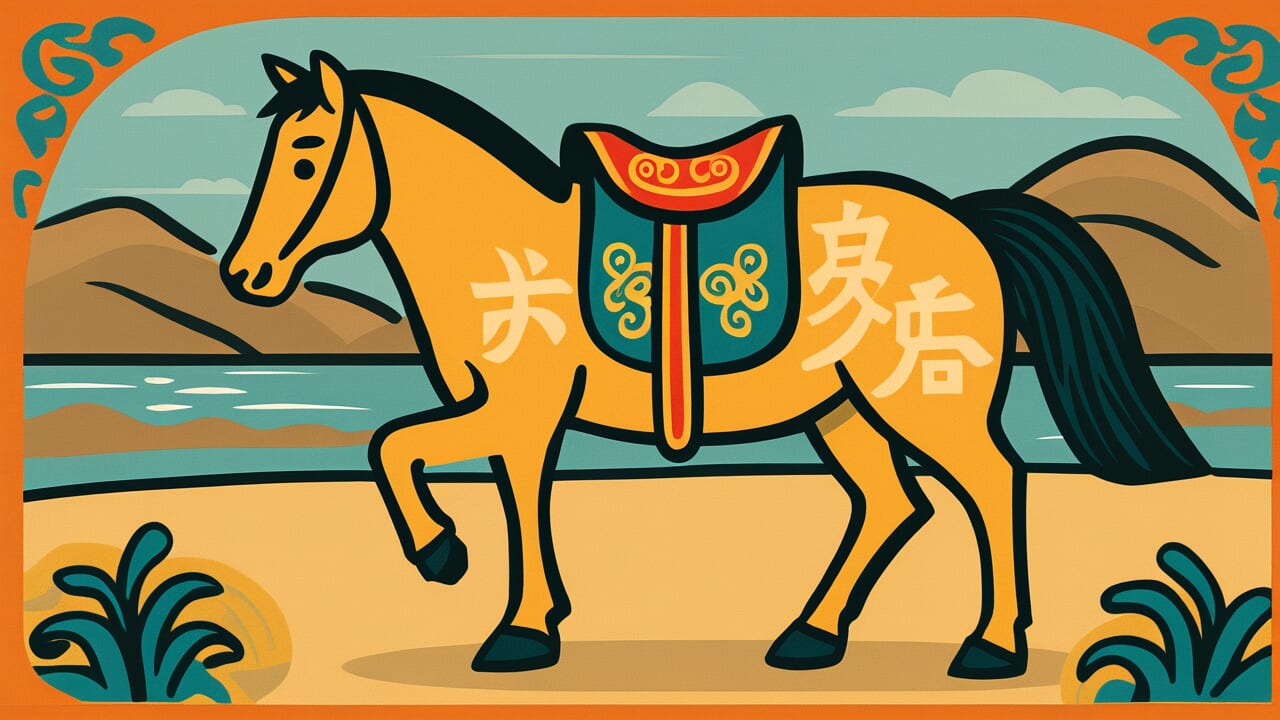How to Read “A Chinese saddle on a packhorse”
Dachinba ni karakura
Meaning of “A Chinese saddle on a packhorse”
“A Chinese saddle on a packhorse” means that decorating something worthless with fancy ornaments is pointless.
It teaches us that no matter how much you dress up the outside, it’s meaningless if the essential value or ability isn’t there.
This proverb emphasizes the importance of seeing the true nature of things.
People use it to criticize situations where only surface decoration matters while the substance is lacking.
For example, giving a high position to someone without sufficient ability won’t bring good results.
Or setting up luxurious equipment for a business without solid foundations won’t lead to success.
Even in modern society, this proverb serves as a warning against focusing too much on appearance and form while neglecting substance.
It conveys a universal truth through an easy-to-understand metaphor: true value lies not in appearance but in content.
Origin and Etymology
No clear written records explain the origin of this proverb.
However, we can make interesting observations from the words themselves.
“Dachinba” refers to working horses used to carry loads.
During the Edo period, horses that transported people and goods served as common transportation.
These weren’t pedigreed champion horses but ordinary horses used for everyday hauling work.
“Karakura” means a luxurious saddle with elaborate decorations imported from China.
At that time, items from Tang China represented the highest quality goods.
Among horse equipment used by samurai and nobles, saddles were especially important items that showed status and wealth.
This proverb likely arose from the contrast between an ordinary working horse and a noble’s luxurious saddle.
It made no sense to put such an expensive saddle on a common labor horse.
People of that era expressed this lesson through familiar horse equipment.
No matter how fine the appearance, it’s wasteful if the essential value isn’t there.
Because horses and saddles were part of daily life, this proverb carried persuasive power.
That’s why it has been passed down to the present day.
Usage Examples
- Even if you’re a new employee buying only expensive suits, it’s like a Chinese saddle on a packhorse if your actual work skills don’t match
- Installing the latest software on an old computer is a Chinese saddle on a packhorse, so you should replace the computer first
Universal Wisdom
Behind the continued use of “A Chinese saddle on a packhorse” lies deep insight into universal human nature.
It recognizes our weakness: we’re more attracted to appearance than substance.
Throughout history, people have found the easy method of decorating the outside more appealing than the steady effort of polishing the inside.
Improving substance requires time and patience, but arranging appearance is relatively simple.
Wear fine clothes and you immediately look respectable.
Carry luxurious tools and you instantly appear first-rate.
This immediate effect tempts us.
But our ancestors saw through the emptiness of such pretense.
No matter how much you decorate the outside, the plating always peels off if substance doesn’t support it.
A workhorse never becomes a champion no matter how luxurious the saddle.
Our ancestors expressed this harsh reality frankly.
This proverb lives on because modern people face the same temptation.
We mistakenly think wearing brand names increases our value.
We assume impressive titles prove our ability.
But true value dwells in the character we polish over time.
This ancestral wisdom continues asking us across the ages: Are you polishing your substance, or just decorating your appearance?
When AI Hears This
In thermodynamics, energy quality is critically important.
For example, energy in 100-degree boiling water versus 20-degree lukewarm water differs completely in “usable work” even with the same total amount.
When you pour high-quality energy into a low-quality system, the difference always dissipates as heat and can never be recovered.
Consider placing a luxury Chinese saddle on a packhorse.
The Chinese saddle, a highly organized craft product, exists in a low-entropy state.
It was transformed from disordered materials into an ordered product through much craftsmanship and time.
Meanwhile, the packhorse as a transport system has low performance—a high-entropy state.
In this combination, the saddle’s “potential value” doesn’t convert to actual work.
It simply transforms into heat through friction and deterioration.
The reverse pattern is interesting.
Even with a cheap saddle on a champion horse, the horse’s performance still shows.
System performance is always limited by the bottleneck—the lowest-performing part.
This resembles the rate-determining step in chemical reactions.
No matter how many high-quality elements you add, the system’s weakest part accelerates entropy increase and lowers overall efficiency.
This irreversibility demonstrates the importance of balance as a physical law.
Lessons for Today
This proverb teaches you the importance of prioritizing your self-investment wisely.
With social media everywhere today, we tend to care excessively about appearance and looks.
But what truly matters is the inner strength you cultivate over time.
For example, if you want career success, develop essential skills like specialized knowledge and communication ability before buying expensive suits or the latest gadgets.
If you’re challenging a certification exam, thoroughly understanding one book matters more than buying many reference books.
This proverb tells you there’s no need to rush.
If you steadily build your foundation, appearance will naturally follow.
People with genuine ability shine without forcing decoration.
Why not start today?
Redirect the time and money you’ve spent decorating your surface toward elevating your substance.
It may seem like a detour, but it’s actually the most reliable path to growth.
Cultivate the potential within you carefully and patiently.



Comments